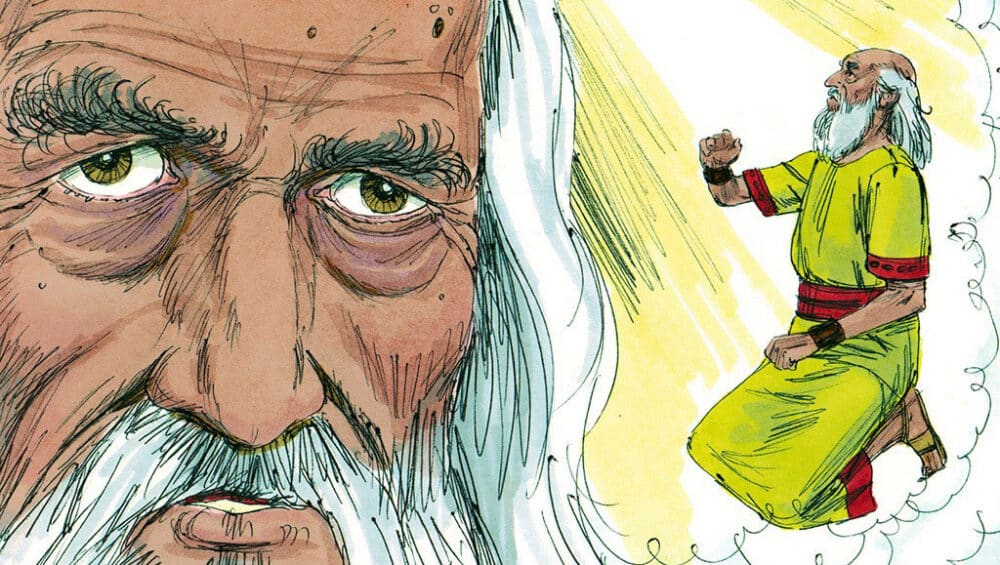Sweet Publishing / FreeBibleimages.org
Welcome to Livin’ Light’s Bible-In-A-Year challenge of discovering God’s love for us and His purpose for our lives. Here is the format for this great adventure: The daily reading assignment is posted at 5 a.m. After each day’s reading, Leigh An Coplin, the blog host, shares observations and poses questions about difficult passages to Rob Fields, who studied Christian Education at Asbury Seminary and currently teaches Biology in the Orlando area. To start from the beginning, click on 365 Bible Readings and scroll down to Day 1. The reading schedule is taken from The One Year Chronological Bible NLT.
Today’s Reading
— 1 Samuel 26:1-27:7
— 1 Chronicles 12:1-7
— 1 Samuel 27:8-29:11
— 1 Chronicles 12:19
— Psalm 56
(1011-1002 BC) Click here for a timeline of the entire Bible.
Questions & Observations
Q. (1 Samuel 26:1-25): Why is Saul after David when they’ve been through this cat-and-mouse chase and after David won, they made peace where Saul acknowledged David’s grace and David agreed to not harm Saul’s family. Although, I didn’t mention it in yesterday’s reading, when I looked back, a verse stuck out. 1 Samuel 24:22 says that Saul went home, but David stayed in the wilderness. If the fighting was truly over, why would David stay hidden?
A. Because he still didn’t trust Saul is the only reason I can give you. It appears his instinct not to trust Saul was proven correct.
Q. (26:16): David keeps referring to Saul as “the Lord’s anointed” almost in jest. So, does everyone know that David is anointed or is it to be revealed to all at a later time?
A. God has made David His king, but he will not become Israel’s king until Saul is dead. It appears that God’s selection of David was not a secret at this point, so perhaps Samuel talked about it before he died.
Q. (27:8-12): Do I have this right that David and his soldiers and their families were living among the Philistines? David would go on raids of whom and why? David was aligning with King Achish, a Philistine. I don’t get this.
A. He did so to move out of Saul’s territory, since this appears to be the only place where Saul would not pursue him — probably because he did not have the military strength. That is probably your answer as to why he allied himself with the Philistines: because they were the only nation strong enough to protect David. It seems to fit under the rule of “the enemy of my enemy is my friend.”
Q. (28:8-19): We haven’t seen anyone talk to anyone in heaven besides God. I always thought that mediums, fortune tellers, witches, whatever they are called were a farce. Apparently not? Again, this is the OT. Are these people just present in the OT times or are they really here now? This reminds me of my questions when the Egyptian “magicians” replicated the staff-to-snake trick of Aaron and Moses (Exodus 7:8-13). I have never believed that magic or possessions exist today. Maybe they do? But, in the staff-to-snake miracle, could God have made the magicians able to do this trick just so he could finish it off with his snake eating their snakes? I was shocked to read Samuel talking again!
A. First, let’s clear something up: it does not appear that Samuel is in “heaven” in the sense that we would understand it. Samuel is in the realm of the dead, Sheol, which is NEITHER heaven nor hell. Much of the OT refers to it as a place of rest for the dead (akin to the Greek concept of Hades), while awaiting judgment at a future date — we will see this referred to as the Day of the Lord in future volumes, so watch for that term. This is why Samuel tells Saul that he will be “with me” in 28:19. Samuel is certainly NOT telling Saul that he is going to heaven when he dies “tomorrow.” So, to get a clear picture of what is going on, you’ve got to remove the simple notion of heaven and hell: eternal judgment in the Bible is not cut and dry at this point in the story (though it will be later!)
In addition to your questions about Egyptian magic, back on Day 76 (when reading Deuteronomy 18), we discussed the issue of communication with the dead, and I mentioned then this story as a forthcoming example, so here’s your pay off. The implication of the story, to me, is that in this era — I couldn’t tell you whether or not you can still do so today — it was possible for certain people to communicate with the dead. They did so using what we would call occult practices today — and they surely still exist. We usually call them Wicca or similar names today. The issue here is not whether or not one can communicate with the dead. This story surely tells us that we COULD, if not can, but rather that God strictly forbids such an act. The reason: consulting the dead, called necromancy, always involves an attempt to learn about or control the future, as Saul is doing here. When we do that, we are no longer trusting God to provide for our future. Now in Saul’s case you can understand his desperation: his prophet is dead, the priesthood has allied itself with David, or been killed by Saul himself, and he appears to have no way to communicate with God. He has painted himself into this corner, but we can certainly sympathize with his plight. It’s going to get bad for Saul and his family.
Q. (29:6): So, Achish acknowledges the Lord here. Are the Philistines just fickle and go back and forth between following the true Lord and idols? Or, was he just simply acknowledging the Lord’s power, even though the Lord is not his God? Another question this brings up is swearing. We may have talked about it before, but it’s worth exploring again. We have read about many of God’s followers — most recently, Jonathan and David and Abigail — swear by God. One of the Ten Commandments, Exodus 20:7 says, “You must not misuse the name of the Lord your God. The Lord will not let you go unpunished if you misuse his name.” I certainly don’t think any of the three I mentioned are misusing God’s name. But, I thought it was a great time to bring the subject up. I have the feeling that whenever I mention the Lord, I have to make sure he would approve of it. I don’t say He said something He didn’t, nor do I use his name casually in blame or whatever. It jabs me when I hear someone say, “God this” or “Jesus that” or “Oh my God,” especially Christians. As I pull the knife out of me, I would like to call the person on it, but never do. What do you say about this, Rob? I found a great paper on this subject. See if you think it’s worth mentioning. http://www.reclaimingthemind.org/blog/2007/06/what-does-it-really-mean-to-take-the-lords-name-in-vein/
A. Okay, you went a bit stream of consciousness on me, but let’s see if we can untangle this. I think the Philistines recognized David’s God, but they would not have acknowledged Him as the God of the whole world, merely Israel. In this era, it was common thinking that the gods had what we might call territories: so the Philistine god watched over his kingdom, the God of Israel watched over Israel, etc. They would have seen the battles between human kings and soldiers as acting out struggles between the various gods. If your army won, it was because your nation’s god was more powerful than your enemies. The Israelites speak of a radical departure for this: only their God exists, and He rules the whole world. This concept would surely have been lost on the Philistine king, and he likely was speaking of the Lord out of his own understanding of gods.
I agree with you that David and the others are not misusing God’s name in the stories you mentioned, and it does come down to casual use of God’s name when His name ALWAYS deserves to be revered. I read on someone’s blog where the writer warned that real danger of violating this commandment is not lightning, i.e. being struck dead, but lightening. When we misuse a name — any name — we cause that name to lose significance: we take it lightly. That might be okay with people, but if we begin to take God lightly — and surely we do that in our society today! — the entire fabric of our relationship with God begins to fall apart. In the end, that only costs us — God does not need us, but we NEED Him. Much that takes place in our world today — the glorification of sin, the loss of morality, etc. — can be traced to the fact that, ultimately, we take God lightly. What better example can there be then in how we show a lack of reverence for the name of God! It can be tricky to get people to see this point of view, but I think with people that we have relationship with; it would be a worthwhile endeavor. Respect for God is surely worth our time.
O. (Psalm 56) This Psalm reminds me of when Jesus feels the doom of his enemies creeping up on Him. David says God is protecting him. He is his shield. Yet, in verse 11, he says “I trust in God, so why should I be afraid?” I know the feeling. I know God is real — I have always felt it, but after seeing how undeniably true the Bible is — I have real proof of God’s existence. Yet, there is always the doubt that if I ask God for something, I won’t get it … that it’s just an empty wish. I’m working on it. David admitting his fear and doubts helps me personalize this story. Verses 12-13 give David’s reason for his faith. This feels like when David ever has his fear, he can refer to this verse to bolster his faith.
For further study: Samuel’s place in God’s plan, https://www.pray.com/articles/who-was-samuel-in-the-bible
Shop: Christian shirts get noticed. Check out these conversation starters: https://livinlight.org/shop/
Tomorrow’s reading
— 1 Samuel 30
— 1 Chronicles 12:20-22
— 1 Samuel 31
— 1 Chronicles 10
— 1 Chronicles 9:40-44
— 2 Samuel 4:4
— 2 Samuel 1











